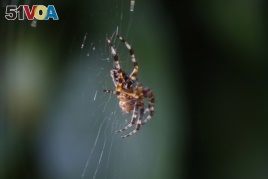10 July, 2019
Baby spiders enjoy the company of other spiders. But adult spiders often eat each other.
New research found that the adults seem to forget how to behave with each other after being alone too long. This causes the small, eight-legged creatures to become aggressive and even violent.
These findings could help researchers understand why some spider species like to stay together their whole lives but most would eat another spider if given the chance.
A report on the study appeared in the scientific publication PLOS Biology.
Many people are frightened of spiders; yet the creatures are an important part of many ecosystems.
Violette Chiara led the study. Chiara is a student at the University of Toulouse in France. She told VOA that spiders are often misunderstood.
"Spiders are not just aggressive, cannibalistic monsters," Chiara said. "There are spiders that are social at the beginning of their lives, and there are also some species that remain social during their whole lives."

FILE - A spider sits in her web. Researchers from England think spiders might be sensing and using electrostatic fields to become airborne.
A friendly start to life
Baby spiders are known as spiderlings. They begin their lives together in groups with other spiderlings — sometimes as many as several hundred. But when spiders grow up, they usually live alone. Of the more than 40,000 known spider species, all but 30 live alone in adulthood.
It is not clear why so few spider species stay social their whole lives. Many researchers believe that spiders become more aggressive as they grow, which makes them avoid each other. Chiara decided to test which comes first: aggressive behavior or self-separation.
Chiara and members of her team studied labyrinth spiders, which are common in France. They observed that baby labyrinth spiders started to move away from each other five days after coming out of their eggs. The researchers first thought this pointed to a natural increase in aggression.
However, they found that even spiderlings raised alone started to move around more after five days. In other words, the spiders were not fleeing from other spiders because they were worried they would get eaten. They were just stretching their legs and becoming better at moving around as they grew.
If an increase in aggressive behavior does not happen naturally as the spiders age, something must cause it. To test this, the researchers raised some spiders alone and others in groups. They then brought together groups of two spiders that did not know each other to see if they reacted peacefully or violently.
Spiders that were raised in groups almost never tried to eat the other spider. But those raised alone went on the attack 40 percent of the time. The more time the spiders had spent alone, the more likely they were to try to eat other spiders. The researchers decided that being alone causes spiders to become aggressive and not the other way around.
Questioning beliefs
Scientist Jonathan Pruitt is an expert on evolution, but was not involved in the research. He said that the study was a good example of re-visiting what people had already believed to be true, "and questioning it and finding a very different story."
The researchers hope to learn what happens to the "loner" spiders that makes them more likely to attack others.
"We know that they are more aggressive, but from a cognitive point of view, what is the change?" said Raphael Jeanson, who helped with the research.
One possibility is that when spiders spend too much time away from other spiders, they forget how to read social cues. In this case, the cues are chemicals in their "skin" that help them recognize each other. The researchers hope to explore this possibility by studying a species that is closely related to labyrinth spiders, but lives in groups all their lives.
Leticia Aviles is a specialist in social spiders, but was not involved in the study. She agreed that the lack of socializing could lead spiders to become more aggressive.
I'm Pete Musto.
Kerry Hensley reported this story for VOANews. Pete Musto adapted the report for Learning English. George Grow was the editor. We want to hear from you. Write to us in the Comments Section or on 51VOA.COM.
_____________________________________________________________
Words in This Story
species – n. a group of animals or plants that are similar and can produce young animals or plants
ecosystem(s) – n. everything that exists in a particular environment
cannibalistic – adj. describing a creature that is willing to eat the flesh of others of its own species
monster(s) – n. a strange or horrible imaginary creature
evolution – n. a theory that the differences between modern plants and animals are because of changes that happened by a natural process over a very long time
cognitive – adj. of, relating to, or involving conscious mental activities, such as thinking, understanding, learning, and remembering
cue(s) – n. something that indicates the nature of what you are seeing or hearing